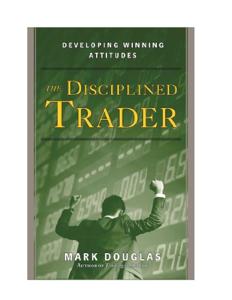
Want to learn the ideas in The Disciplined Trader better than ever? Read the world’s #1 book summary of The Disciplined Trader by Mark Douglas here.
Read a brief 1-Page Summary or watch video summaries curated by our expert team. Note: this book guide is not affiliated with or endorsed by the publisher or author, and we always encourage you to purchase and read the full book.
Video Summaries of The Disciplined Trader
We’ve scoured the Internet for the very best videos on The Disciplined Trader, from high-quality videos summaries to interviews or commentary by Mark Douglas.
1-Page Summary of The Disciplined Trader
A New Way of Thinking
Most new traders don’t know that their habits and beliefs, which have served them well in the outside world, may become stumbling blocks when they trade. Trading requires much more self-discipline than other activities. The markets do not force you to act one way or another; instead, you are your own boss. You can gain or lose an almost infinite amount of money as a trader, so it’s important to be careful and disciplined because many people suffer disastrous losses due to their lack of discipline and control over their emotions. Many people respond by rationalizing what they’ve done or denying what happened altogether—all of these responses color their perceptions about the market and may lead them into a continuing pattern of bad decisions until the market forces them to face facts.
Although you can’t control the market, you can control how you think about it. Self-control, emotional restraint and flexibility are not part of the market; they’re part of your personality. You need to learn them so that they become second nature to you. You can do this by trial and error, but that’s a long process with no guarantee of success. Trading is difficult for most people because they don’t have the skills or discipline required to succeed at it. To be successful as a trader, you need:
- If you want to succeed in the stock market, it’s important that you focus on your goals instead of your fears. You should find out what information is necessary and acquire new skills so that when opportunity presents itself, you can take advantage of it. It’s also important to be flexible and adapt as circumstances change. When taking risks, make sure they’re manageable; don’t overextend yourself or trade too much based on hope or greed. Think objectively about things by considering all possibilities before making a decision. Don’t let false hunches cloud your judgment; use intuition only after careful consideration of the facts and probabilities involved in any situation.
What’s Right? The Market Is
The price of an asset is determined by the consensus view of all traders. It doesn’t matter what they actually believe or how much information they have. The price is right if it reflects the consensus opinion, even if most traders are irrational and uninformed. No trader can be more right than the market itself, because no one has sufficient financial clout to move prices around on their own for a long time. A careful observer can predict where prices will go next based on current trends and news events, but you should not cling to your predictions when prices move in another direction.
Infinite Opportunity to Gain or Lose
Trading is a risky business. You can make or lose money, but it’s hard to know exactly how much you’ll win or lose with each trade. That makes trading more dangerous than gambling because gamblers usually have a clear idea of their odds and what they could potentially win or lose with each bet. The lack of limits in trading means that prices can keep moving up or down indefinitely, making your potential gains and losses bigger and bigger. It’s easy to get carried away when you think you’ll become rich if only the market goes your way; however, ignoring evidence that the market won’t go your way will probably lead to disaster. Remain objective about the risks involved in trading so that you don’t fall prey to wishful thinking about getting rich quickly at all costs.
Prices Are Always Moving
Markets are never closed. Even when they close, people continue to think about what happened during the day and how it will affect them tomorrow. Winners get carried away by greed and losers hope for a turnaround, so they’re both planning their next moves while the market is closed. Remember that you can only afford to lose money if it’s not important to you, otherwise your emotions will cloud your judgement of whether or not you should be buying stocks at all. If you do buy stocks on an impulse after a good day at work or from seeing someone else make lots of money, then try taking profits when the stock goes up or cutting losses if it goes down.





